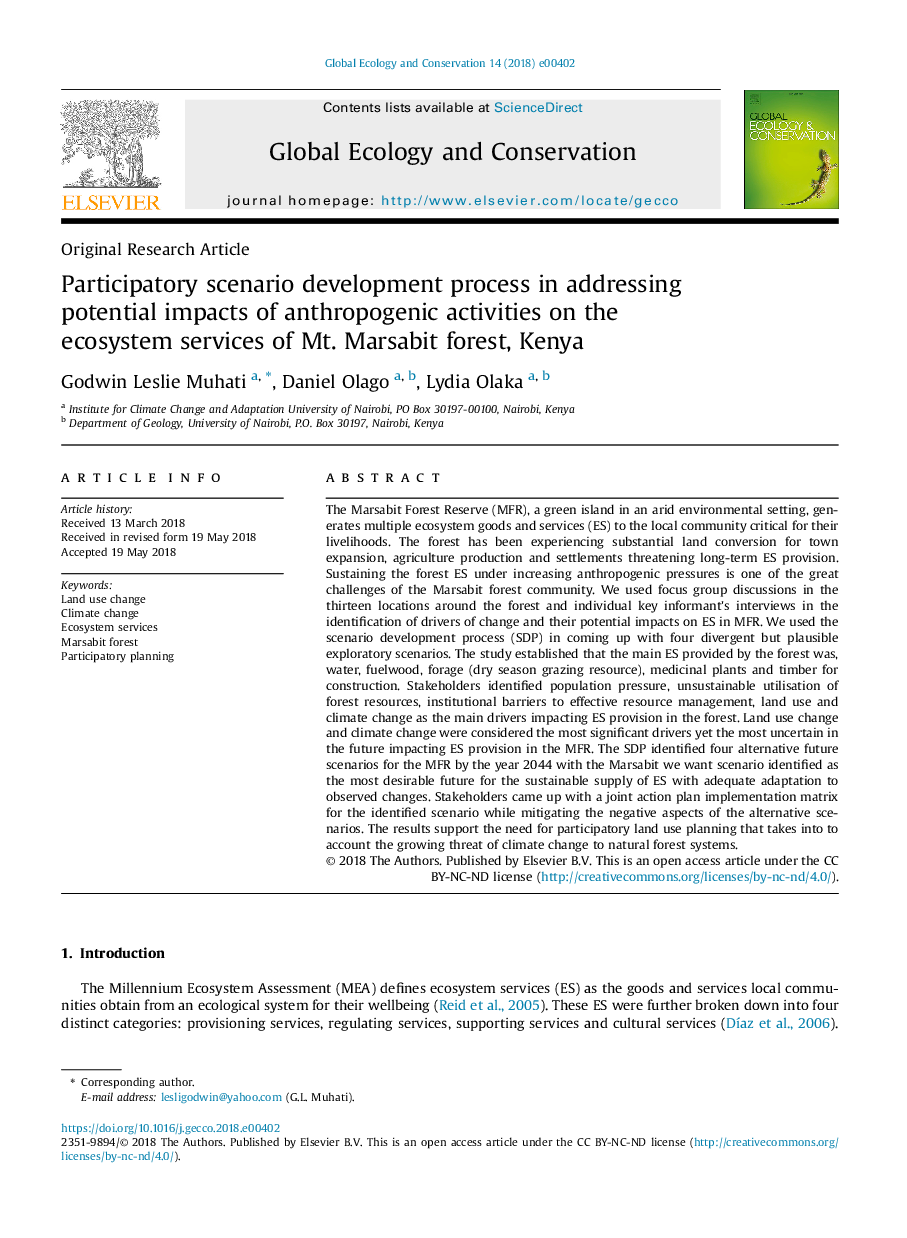| کد مقاله | کد نشریه | سال انتشار | مقاله انگلیسی | نسخه تمام متن |
|---|---|---|---|---|
| 8846210 | 1617653 | 2018 | 20 صفحه PDF | دانلود رایگان |
عنوان انگلیسی مقاله ISI
Participatory scenario development process in addressing potential impacts of anthropogenic activities on the ecosystem services of Mt. Marsabit forest, Kenya
ترجمه فارسی عنوان
روند توسعه سناریو مشارکتی در رسیدگی به تأثیرات بالقوه فعالیت های انسان شناسی بر خدمات اکوسیستم در کوه. جنگل مارشال، کنیا
دانلود مقاله + سفارش ترجمه
دانلود مقاله ISI انگلیسی
رایگان برای ایرانیان
کلمات کلیدی
تغییر کاربری زمین، تغییر آب و هوا، خدمات محیط زیستی، جنگل مارشال، برنامه ریزی مشارکتی
موضوعات مرتبط
علوم زیستی و بیوفناوری
علوم کشاورزی و بیولوژیک
بوم شناسی، تکامل، رفتار و سامانه شناسی
چکیده انگلیسی
The Marsabit Forest Reserve (MFR), a green island in an arid environmental setting, generates multiple ecosystem goods and services (ES) to the local community critical for their livelihoods. The forest has been experiencing substantial land conversion for town expansion, agriculture production and settlements threatening long-term ES provision. Sustaining the forest ES under increasing anthropogenic pressures is one of the great challenges of the Marsabit forest community. We used focus group discussions in the thirteen locations around the forest and individual key informant's interviews in the identification of drivers of change and their potential impacts on ES in MFR. We used the scenario development process (SDP) in coming up with four divergent but plausible exploratory scenarios. The study established that the main ES provided by the forest was, water, fuelwood, forage (dry season grazing resource), medicinal plants and timber for construction. Stakeholders identified population pressure, unsustainable utilisation of forest resources, institutional barriers to effective resource management, land use and climate change as the main drivers impacting ES provision in the forest. Land use change and climate change were considered the most significant drivers yet the most uncertain in the future impacting ES provision in the MFR. The SDP identified four alternative future scenarios for the MFR by the year 2044 with the Marsabit we want scenario identified as the most desirable future for the sustainable supply of ES with adequate adaptation to observed changes. Stakeholders came up with a joint action plan implementation matrix for the identified scenario while mitigating the negative aspects of the alternative scenarios. The results support the need for participatory land use planning that takes into to account the growing threat of climate change to natural forest systems.
ناشر
Database: Elsevier - ScienceDirect (ساینس دایرکت)
Journal: Global Ecology and Conservation - Volume 14, April 2018, e00402
Journal: Global Ecology and Conservation - Volume 14, April 2018, e00402
نویسندگان
Godwin Leslie Muhati, Daniel Olago, Lydia Olaka,
